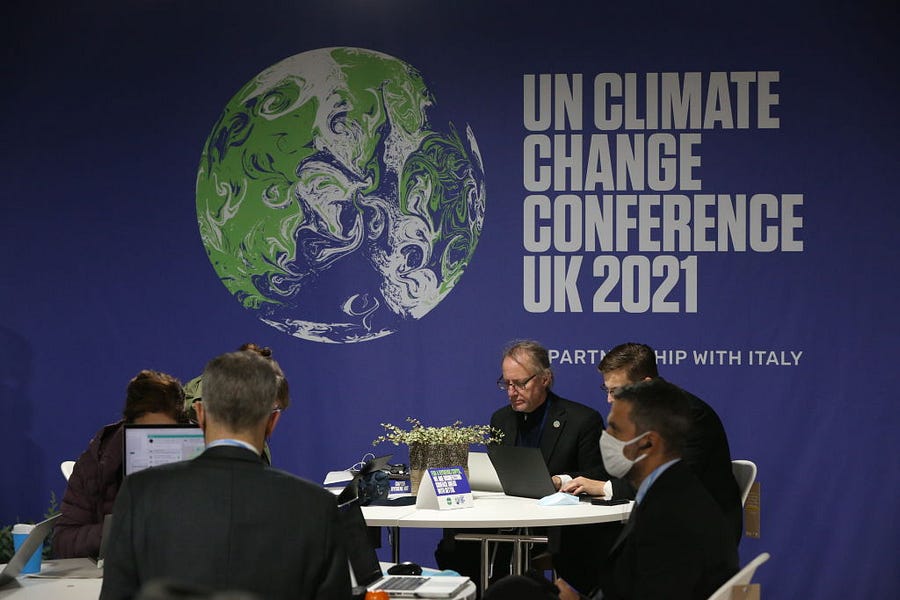Anxious about this week’s COP26 climate conference in Glasgow, Scotland? According to climate activists, the gathering of world leaders is humanity’s “last chance” to take action against climate change. “If we don’t really take the decisions that are vital now, it’s going to be almost impossible to catch up,” Prince Charles said in an interview with the BBC earlier this month.
Perhaps it is time to relax. True, climate change driven by man-made carbon emissions is real and carries large downside risks, though perhaps not quite as nightmarish as Greta Thunberg, the Extinction Rebellion, and the Defense Secretary Lloyd Austin would like us to believe. Climate change also warrants policy action, even urgent and costly actions, aimed at decarbonizing the world’s economies at a much faster pace.
Here is the catch, though. Climate summitry, painstakingly negotiated multilateral agreements and protocols, and pledges to meet specific emissions targets are at best tangential to the (very much worthwhile) aim of ending humankind’s dependence on fossil fuels and shielding the vulnerable from climate change’s adverse effects. At worst, they are a tool that geopolitical competitors and bad faith actors can use to extract concessions from Western democracies.
The 1997 Kyoto Protocol, which started the era of multilateral efforts at tackling global change, had no discernible effect on carbon emissions. The two-week Copenhagen summit in 2009, meanwhile, failed to produce a binding agreement to reduce emissions. In a bow to reality (and to some disappointment of the activist class), the Paris Accord of 2015 was a qualitatively different and looser kind of agreement: one that relied on voluntary pledges, emissions targets set by countries themselves, and also eschewed sanctions for non-compliance.
By putting countries firmly into the driving seat, the Paris Accord recognized that decarbonization will not result from some big-bang bargain struck by the world’s leaders but rather from national policies that have to be themselves politically and economically sustainable.
Even without ratifying the Kyoto Protocol and despite pulling out of the Paris Accord, the United States has been decarbonizing since 2004, including during the Trump years (except for 2018). The downward trend is primarily as a result of the U.S. economy’s gradual move away from coal. China (which has ratified the Kyoto Protocol and joined the Paris Accord with fanfare) has seen its annual emissions triple since 2000, currently exceeding carbon emissions of all developed economies combined.
Proponents of multilateral action point to the success of the 1987 Montreal Protocol, which phased out ozone-depleting substances such as chlorofluorocarbons and halons. But those, used mostly as refrigerants, carried a tiny economic footprint and had easily available substitutes. Given the ubiquity of fossil fuels, decarbonization—together with policies needed to mitigate adverse effects of climate change and/or adapt to them—is a task of an entirely different degree of magnitude and complexity.
In other words, as the 2010 Hartwell Paper, written in response to the failure of the 2009 Copenhagen Summit, put it, “rather than being a discrete problem to be solved, climate change is better understood as a persistent condition that must be coped with and can only be partially managed more – or less – well.”
Most importantly, the talk of decarbonizing and of “emissions targets” requires a radical reframing. Carbon emissions are not going to fall in a sustainable fashion because politicians sign pledges to cut them. They will decline only as a side product of an availability of energy alternatives that are cheaper and more reliable than fossil fuels. The bulk of “climate policy” in the West, therefore, should be geared toward the development and deployment of better energy sources, which through market forces (and maybe with the help of a carbon tax) will replace the carbon-intensive sources of energy we are relying on today.
In all of that, gatherings of global leaders and celebrities, such as COP26, are a sideshow. In fact, it is worse than that. To the extent to which such summits are seen by Western policymakers as a sine qua non of successfully addressing the issue of climate change, they can lead to concessions to revisionist powers and rogue regimes (think China) to keep them at the negotiating table or to make more ambitious though unenforceable pledges. Europeans are particularly susceptible to this illusion. As a result, the EU’s China strategy, for example, treats Beijing simultaneously as a “competitor,” a “systemic rival,” and as a “cooperation partner.”
The Biden administration is by no means immune to the temptation to worship at the altar of climate multilateralism. Given China’s modest opening pitch and Xi Jinping’s decision to skip the summit, the risk that Western countries will go out of their way to placate China in order to step up its climate commitments is real. In that sense, the more underwhelmed we end up about Glasgow’s outcome, the better.
Dalibor Rohac is senior fellow at the American Enterprise Institute in Washington DC. Follow him on Twitter @DaliborRohac.








Please note that we at The Dispatch hold ourselves, our work, and our commenters to a higher standard than other places on the internet. We welcome comments that foster genuine debate or discussion—including comments critical of us or our work—but responses that include ad hominem attacks on fellow Dispatch members or are intended to stoke fear and anger may be moderated.